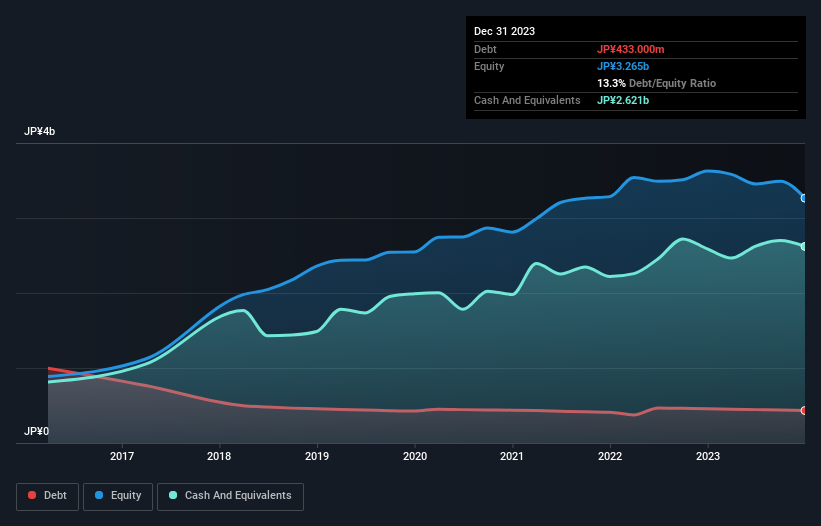- Japan
- /
- Electronic Equipment and Components
- /
- TSE:6698
ViSCO Technologies (TSE:6698) Has Debt But No Earnings; Should You Worry?
The external fund manager backed by Berkshire Hathaway's Charlie Munger, Li Lu, makes no bones about it when he says 'The biggest investment risk is not the volatility of prices, but whether you will suffer a permanent loss of capital.' So it seems the smart money knows that debt - which is usually involved in bankruptcies - is a very important factor, when you assess how risky a company is. Importantly, ViSCO Technologies Corporation (TSE:6698) does carry debt. But the more important question is: how much risk is that debt creating?
When Is Debt Dangerous?
Generally speaking, debt only becomes a real problem when a company can't easily pay it off, either by raising capital or with its own cash flow. In the worst case scenario, a company can go bankrupt if it cannot pay its creditors. While that is not too common, we often do see indebted companies permanently diluting shareholders because lenders force them to raise capital at a distressed price. Of course, plenty of companies use debt to fund growth, without any negative consequences. When we examine debt levels, we first consider both cash and debt levels, together.
Check out our latest analysis for ViSCO Technologies
What Is ViSCO Technologies's Net Debt?
The image below, which you can click on for greater detail, shows that ViSCO Technologies had debt of JP¥433.0m at the end of December 2023, a reduction from JP¥456.0m over a year. However, it does have JP¥2.62b in cash offsetting this, leading to net cash of JP¥2.19b.

How Healthy Is ViSCO Technologies' Balance Sheet?
Zooming in on the latest balance sheet data, we can see that ViSCO Technologies had liabilities of JP¥1.01b due within 12 months and liabilities of JP¥134.0m due beyond that. Offsetting these obligations, it had cash of JP¥2.62b as well as receivables valued at JP¥888.0m due within 12 months. So it actually has JP¥2.37b more liquid assets than total liabilities.
This excess liquidity is a great indication that ViSCO Technologies' balance sheet is almost as strong as Fort Knox. Having regard to this fact, we think its balance sheet is as strong as an ox. Simply put, the fact that ViSCO Technologies has more cash than debt is arguably a good indication that it can manage its debt safely. There's no doubt that we learn most about debt from the balance sheet. But you can't view debt in total isolation; since ViSCO Technologies will need earnings to service that debt. So if you're keen to discover more about its earnings, it might be worth checking out this graph of its long term earnings trend.
Over 12 months, ViSCO Technologies made a loss at the EBIT level, and saw its revenue drop to JP¥3.3b, which is a fall of 12%. That's not what we would hope to see.
So How Risky Is ViSCO Technologies?
While ViSCO Technologies lost money on an earnings before interest and tax (EBIT) level, it actually generated positive free cash flow JP¥139m. So although it is loss-making, it doesn't seem to have too much near-term balance sheet risk, keeping in mind the net cash. There's no doubt the next few years will be crucial to how the business matures. The balance sheet is clearly the area to focus on when you are analysing debt. However, not all investment risk resides within the balance sheet - far from it. We've identified 3 warning signs with ViSCO Technologies (at least 1 which is potentially serious) , and understanding them should be part of your investment process.
Of course, if you're the type of investor who prefers buying stocks without the burden of debt, then don't hesitate to discover our exclusive list of net cash growth stocks, today.
New: Manage All Your Stock Portfolios in One Place
We've created the ultimate portfolio companion for stock investors, and it's free.
• Connect an unlimited number of Portfolios and see your total in one currency
• Be alerted to new Warning Signs or Risks via email or mobile
• Track the Fair Value of your stocks
Have feedback on this article? Concerned about the content? Get in touch with us directly. Alternatively, email editorial-team (at) simplywallst.com.
This article by Simply Wall St is general in nature. We provide commentary based on historical data and analyst forecasts only using an unbiased methodology and our articles are not intended to be financial advice. It does not constitute a recommendation to buy or sell any stock, and does not take account of your objectives, or your financial situation. We aim to bring you long-term focused analysis driven by fundamental data. Note that our analysis may not factor in the latest price-sensitive company announcements or qualitative material. Simply Wall St has no position in any stocks mentioned.
About TSE:6698
ViSCO Technologies
Engages in the development, manufacture, sale, and maintenance of machine vision systems in Japan and internationally.
Flawless balance sheet very low.
Market Insights
Weekly Picks

THE KINGDOM OF BROWN GOODS: WHY MGPI IS BEING CRUSHED BY INVENTORY & PRIMED FOR RESURRECTION


Why Vertical Aerospace (NYSE: EVTL) is Worth Possibly Over 13x its Current Price


The Quiet Giant That Became AI’s Power Grid
Recently Updated Narratives


Insiders Sell, Investors Watch: What’s Going On at PG?

Waiting for the Inevitable


Near zero debt, Japan centric focus provides future growth
Popular Narratives


MicroVision will explode future revenue by 380.37% with a vision towards success


NVDA: Expanding AI Demand Will Drive Major Data Center Investments Through 2026




